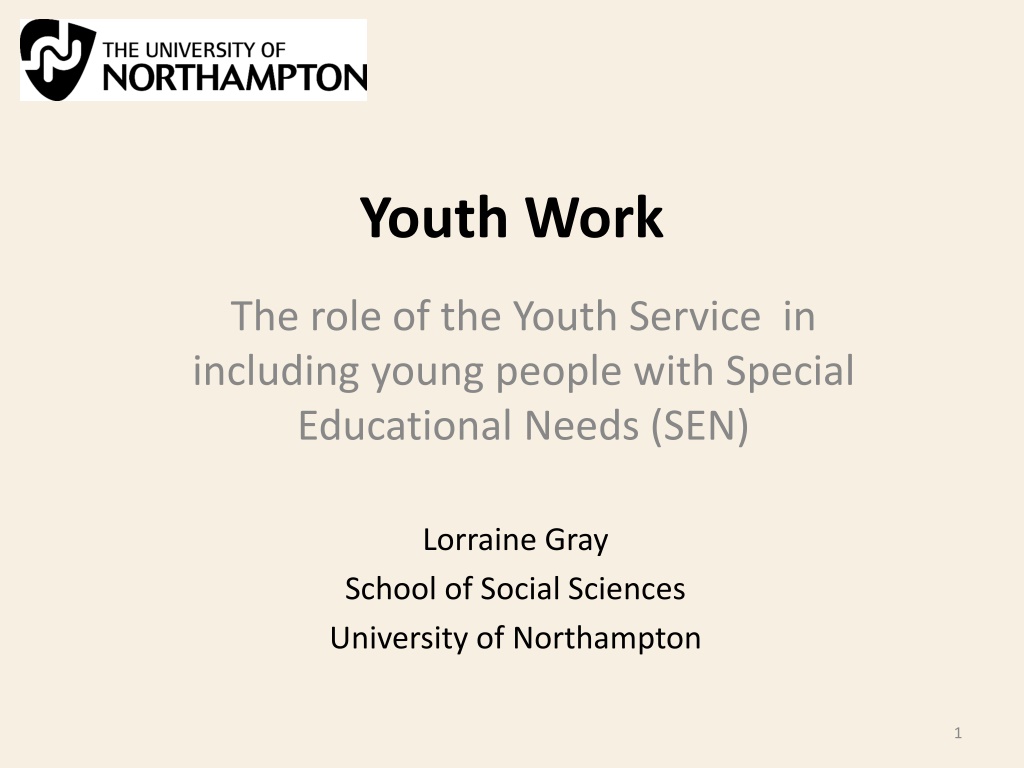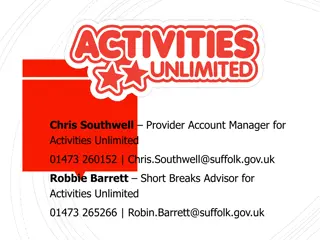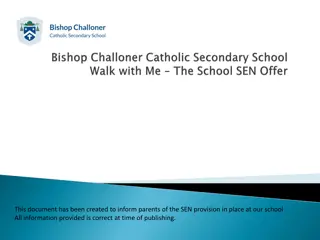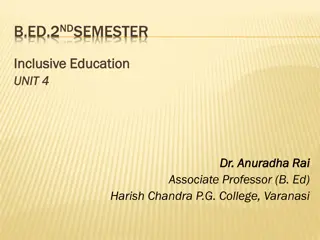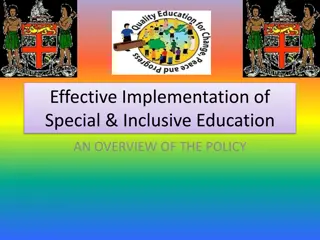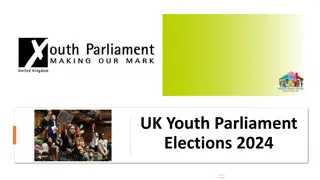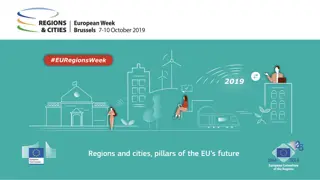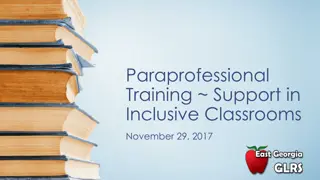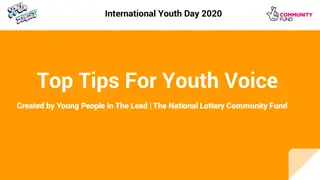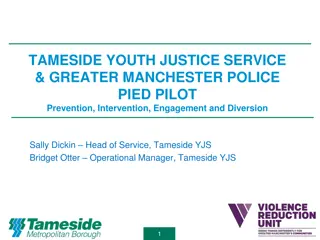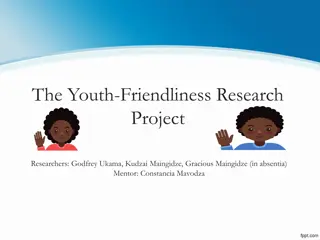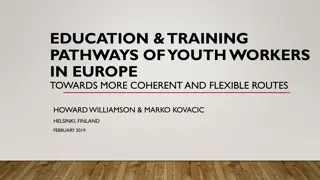Understanding the Role of Youth Service in Inclusive Support for Young People with Special Educational Needs
Exploring the significance of youth work in supporting young individuals with Special Educational Needs (SEN), this session outlines the responsibilities and competencies of youth workers, emphasizes the values and principles of youth work, and delves into the National Occupational Standards guiding this profession. The session sheds light on critical aspects of providing youth work for disabled young people and discusses strategies to enhance inclusive practices.
- Youth Service
- Special Educational Needs
- Youth Work
- Inclusive Support
- National Occupational Standards
Download Presentation

Please find below an Image/Link to download the presentation.
The content on the website is provided AS IS for your information and personal use only. It may not be sold, licensed, or shared on other websites without obtaining consent from the author. Download presentation by click this link. If you encounter any issues during the download, it is possible that the publisher has removed the file from their server.
E N D
Presentation Transcript
Youth Work The role of the Youth Service in including young people with Special Educational Needs (SEN) Lorraine Gray School of Social Sciences University of Northampton 1
Session Outline Who youth workers are? The meaning of the term Youth Work What is youth work all about? National Occupational Standards including the key purpose, youth work values and competencies Youth work context Employment Critical issues in the provision of youth work for young disabled people (OFSTED Report) Taking youth work for disabled young people forward: rising to the challenge 2
Who Youth Workers Are? Youth workers are professionals having qualified in a National Youth Agency (NYA) validated course. The NYA undertakes, on behalf of the Joint Negotiating Committee (JNC) the professional validation of training and qualification programmes conferring professional qualified status for youth workers in England. National Youth Agency: http://www.nya.org.uk 3
The Meaning of the Term Youth Work When people talk about youth work they can mean very different things. For example, they might be describing work with: running a youth club; making contact with different groups of young people on an estate; a group of Guides; mentoring a young person; facilitating a church fellowship; or tutoring on a mountain walking course. 4
What is youth work all about? Youth work helps young people learn about themselves, others and society, through informal educational activities which combine enjoyment, challenge and learning. Youth workers work primarily with young people aged between 13 and 19. Their work seeks to promote young people s personal and social development and enable them to have a voice, influence and place in their communities and society as a whole. Youth work is underpinned by a clear set of values. These include young people choosing to take part; starting with young people s view of the world; treating young people with respect; seeking to develop young people s skills and attitudes rather than remedy problem behaviours ; helping young people develop stronger relationships and collective identities; respecting and valuing differences; and promoting the voice of young people. National Youth Agency Guide to Youth Work: http://www.nya.org.uk/about-nya/what-is-youth-work 5
National Occupational Standards The Youth Work National Occupational Standards (NOS) aim to define the competencies required to carry out the functions carried out by the youth work workforce. The NOS are intended to describe the competencies required to fulfil the tasks required in the youth sector. 6
Key Purpose The key purpose of youth work is to: Enable young people to develop holistically, working with them to facilitate their personal, social and educational development, to enable them to develop their voice, influence and place in society and to reach their full potential. UK Commission for Employment and Skills (2012), p.4 7
Youth Work Values Participation and active involvement: Young people choose to be involved, not least because they want to relax, meet friends, make new relationships, to have fun, and to find support. The work starts from where young people are in relation to their own values, views and principles, as well as their own personal and social space. It seeks to go beyond where young people start, to widen their horizons, promote participation and invite social commitment, in particular by encouraging them to be critical and creative in their responses to their experience and the world around them. UK Commission for Employment and Skills (2012), p.5 8
Youth Work Values Equity, diversity and inclusion: It treats young people with respect, valuing each individual and their differences, and promoting the acceptance and understanding of others, whilst challenging oppressive behaviour and ideas. It respects and values individual differences by supporting and strengthening young people s belief in themselves, and their capacity to grow and to change through a supportive group environment. It is underpinned by the principles of equity, diversity and interdependence. UK Commission for Employment and Skills (2012), p.5 9
Youth Work Values Partnership with young people and others: It recognises, respects and is actively responsive to the wider networks of peers, communities, families and cultures which are important to young people, and through these networks seeks to help young people to achieve stronger relationships and collective identities, through the promotion of inclusivity. It works in partnership with young people and other agencies which contribute to young people s social, educational and personal development. It recognises the young person as a partner in a learning process, complementing formal education, promoting their access to learning opportunities which enable them to fulfil their potential. UK Commission for Employment and Skills (2012), p.5 10
Youth Work Values Personal, social and political development: It is concerned with how young people feel, and not just with what they know and can do. It is concerned with facilitating and empowering the voice of young people, encouraging and enabling them to influence the environment in which they live. It safeguards the welfare of young people, and provides them with a safe environment in which to explore their values, beliefs, ideas and issues. UK Commission for Employment and Skills (2012), p.5 11
Youth Work Context Youth work skills are in great demand, and opportunities for JNC recognised qualified youth workers are expanding. In addition to employment within local authority youth services, the opportunities for employment in other sectors continue to increase including Social Enterprise and Community Interest Companies Youth workers are found working in other local authority departments such as leisure, arts and housing, health authorities, youth justice teams, and a range of voluntary organisations. National Youth Agency: http://www.nya.org.uk/workforce-and-training/want-to-work-in-youth-work 13
Employment A look at job advertisements in Children and Young People Now magazine frequently show vacancies in generic youth work, Integrated Youth Support Services, Connexions, sports development, youth action, drugs projects, youth offending teams, social services, health work and community development. Children and Young People Now magazine: http://www.cypnowjobs.co.uk/searchjobs/?Keywords=youth 14
Critical issues in the provision of youth work for young disabled people The Ofsted survey reports on young disabled people s access to youth work and its impact on their lives. Inspectors undertook a sample of 18 visits to local authorities, charities and voluntary and community sector organisations, each of which were promoting work of this nature. 15
Survey findings Much of the work seen was successful in its primary purpose to develop young people s autonomy while fostering a range of practical, personal and social skills. In the projects visited, inspectors found that the majority of disabled young people who accessed youth work enjoyed a supportive, enjoyable and beneficial experience. Indeed, its informal settings and often relaxed approached proved highly conducive to their social development, work readiness, enjoyment and learning. Young disabled people had a say in what they did. 16
Survey findings Involvement in youth work very often opened new doors that allowed progression to new opportunities. The most effective work, where practical, gave weight to the development of young people s personal, social, political, and work-related skills and aptitudes. 17
Survey findings Befriending has helped me to be more confident in myself. It has helped me to start to be able to trust other people that I haven t met before. Amy has shown me that in actual fact other people do care about me and they are and have been there for me when I have needed them most. A big, big, big thank you! Love Laura xxx Age: 14 years. Good practice case study: Befriending and buddying for young disabled people: Kent County Council. http://www.ofsted.gov.uk/resources/120399 18
However In the few instances where inspectors found that young disabled people were not benefiting enough from their involvement in youth work, expectations of what they could achieve were too low. Overall participation rates were low and those young people not known to services, and who would benefit from the opportunities and support that youth work affords, were clearly less well served. 19
How youth workers collaborate with other professionals Much face-to-face youth work practice is good. In the most effective practice, specialist disability staff and generic youth workers combine their skills and experience to good effect. 20
Taking youth work for disabled young people forward: rising to the challenge Young disabled people told inspectors that expectations of what they could achieve in their day to day lives were often too low. Good youth work had the benefit of developing young people s resilience, aptitudes and drive and provided them and their peers with challenge. 21
Good Practice In a very practical way, this had an impact on their personal, social, political, and work-related skills. Structuring programmes well ensured that young people enjoyed a balance of enjoyment and learning, especially where they had a say in what they did. 22
Four critical issues in the provision of youth work for young disabled people Issue 1: Enjoyment and learning curriculum structure and design Issue 2: The benefits of youth work Issue 3: Managing disabled young people s engagement and achievement Issue 4: Youth workers and other practitioners professional matters 23
Group Activity Today you are all honorary youth workers, we will work in small groups. In your groups: Consider some of the issues identified by OFSTED Create a youth work project that responds to the findings of the survey The project should reflect youth work values What will the project do? Design a poster to promote the project 24
Group A Enjoyment and learning curriculum structure and design: Survey findings (1) Inspectors identified that where youth work for young people with disabilities was particularly successful, organisations converted their empowering philosophy into practical projects that: developed young people s resilience and drive moved them beyond the highly supportive and unchallenging environment to which they were often accustomed. 25
Group B Enjoyment and learning curriculum structure and design: Survey findings (2) Programmes that allowed young people to have a say in what they did, so that they enjoyed taking part in activities which were new, different and which stretched them. Informal/unplanned curricula were not unplanned but premised on young people exercising choice in what they did, for example deciding to spend time alone or with others. Formal/structured curricula successfully fostered young people s specific vocational and work-related skills and effectively developed their independence and greater confidence in decision-making. 26
Group C The benefits of youth work: Survey findings personal development (1) Young disabled people who spoke to inspectors stressed the importance of having space to be themselves. Parents noted that the emotional and physical safety provided in such informal settings had a stabilising effect. Young people valued the sessions/programmes targeted at specific disabled groups as these could accommodate particular behavioural traits without the young people worrying about how they may be perceived by their peers. 27
Group D The benefits of youth work: Survey findings personal development (2) The best programmes developed ambition and motivation and young people were able to practise and apply relationship and communication skills in a protected setting. There were notable instances in such settings where young disabled people, often with very advanced skills, supported their peers in areas such as social networking, thinking through plans and ideas or simply by applying patience and an understanding ear. 28
Group E The benefits of youth work: Survey findings social development (1) Inspectors found strong and convincing evidence that the best youth work seen also provided a sound platform for young people s social development. The strong emphasis on working with others helped some young people gain confidence in themselves, and better understand their strengths and weaknesses. 29
Group F The benefits of youth work: Survey findings social development (2) First-class examples were seen where young people gained confidence through opportunities to socialise with their peers and supportive adults. In this way, young people became more skilled, empathetic and sensitive in their dealings with others. They learnt to read social cues and non- verbal behaviour. In group problem-solving tasks, young people learnt to develop their communication and listening skills and to take turns. 30
Group G The benefits of youth work: Survey findings skills for life and independence (1) A large proportion of the programmes visited by inspectors sought to impart the skills which could contribute to young people s independence. Convincing examples were seen of young people managing their time and travel arrangements to attend a specific venue. With a view to instilling healthy habits, cooking and diet featured often. Effective work was taking place, formally and informally, on personal issues such as touch, hygiene and healthy relationships. 31
Group H The benefits of youth work: Survey findings skills for life and independence (2) Residential opportunities were used highly effectively; young people tried new things and became less reliant on others. Young people often reported that their parents 'sheltered' them but that the challenge of residential activities allowed them to take calculated risks and develop skills in a new but safe environment. They achieved much in terms of their self- esteem through outdoor challenges such as climbing and abseiling. 32
Task In your group create a youth work project that responds to the findings of the survey. The project should reflect youth work values What will the project do? Design a poster to promote the project and a 5- minute presentation of your ideas 33
Acknowledgement The content in this presentation is reproduced from the following resources: Ofsted resources (http://www.ofsted.gov.uk/resources/130018) licenced under Open Government Licence: Critical issues in the provision of youth work for young disabled people.doc Issue 1 Youth work for young disabled people enjoying and learning.ppt Issue 2 Youth work for young disabled people the benefits of youth work.ppt Youth Work National Occupational Standards Introduction, http://www.cywu.org.uk/download.php?type=c&id=146, with the permission from the UK Commission for Employment and Skills. 34
